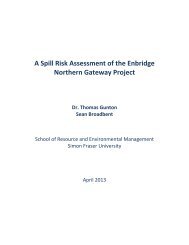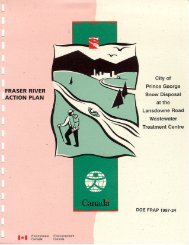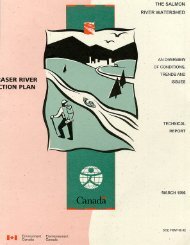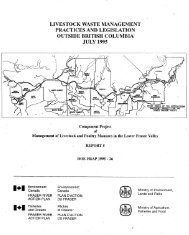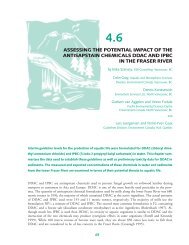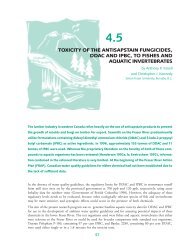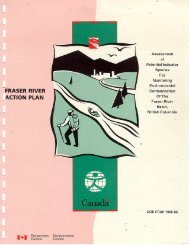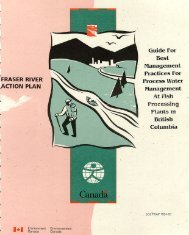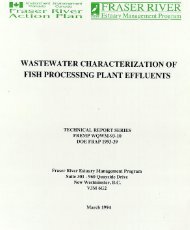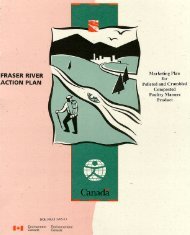Proceedings - Teaching and Learning Centre - Simon Fraser ...
Proceedings - Teaching and Learning Centre - Simon Fraser ...
Proceedings - Teaching and Learning Centre - Simon Fraser ...
Create successful ePaper yourself
Turn your PDF publications into a flip-book with our unique Google optimized e-Paper software.
<strong>Fraser</strong> River Action Plan 3rd Research Workshop<br />
Opening Remarks<br />
B. Wilson - Director, Environmental Conservation Branch, Environment Canada<br />
I would like to welcome you to this, the third Environment Canada FRAP Research Workshop.<br />
My name is Brian Wilson <strong>and</strong>, as director of the Environmental Conservation Branch in the Pacific <strong>and</strong> Yukon<br />
region, I am responsible for overseeing Environment Canada’s role in the <strong>Fraser</strong> River Action Plan.<br />
Once upon a time, I was a research scientist <strong>and</strong> because, or maybe in spite of that, I have always respected the<br />
fundamental importance of good science to the progress of a modern society. Fifteen years ago, I ab<strong>and</strong>oned<br />
active research to pursue a career in management where I have learned the equally fundamental importance of:<br />
having clients for our science; making science relevant to those clients; <strong>and</strong>, using our science to change the way<br />
we think about the environment <strong>and</strong> how we make decisions that affect the environment.<br />
From the very beginnings of FRAP, we realized that our success in delivering sustainable development in the<br />
basin would depend in large measure on our scientific underst<strong>and</strong>ing of the <strong>Fraser</strong> basin <strong>and</strong> how it functions<br />
under both normal <strong>and</strong> stressed conditions. As a result, the FRAP Commitment to research has been both broad<br />
in its scope <strong>and</strong> intensive in its application. Indeed, one of the legacies of FRAP will be the new knowledge of<br />
the <strong>Fraser</strong> basin that has been gained. But a far more important legacy of the FRAP Research Program will be<br />
the impact that this new knowledge <strong>and</strong> underst<strong>and</strong>ing will have on decision makers throughout the basin, <strong>and</strong><br />
through them, on the long-term health of the <strong>Fraser</strong> basin environment.<br />
We are at a critical juncture in the <strong>Fraser</strong> River Action Plan. We have five years of effort under our belts <strong>and</strong> the<br />
program has two more years to go. People are beginning to ask what we have achieved so far <strong>and</strong> what we<br />
expect to deliver in the way of results by the end of the program. Taxpayers are wanting to know what return<br />
they can expect on their substantial investment in the program. Governments are asking what relevance the<br />
program has for them <strong>and</strong> the general public is asking, “What is this thing called ‘FRAP’ anyway?”<br />
Clearly, we need to do a good job of profiling the program <strong>and</strong> marketing its results. Clearly, we need to do a<br />
good job of getting our science to decision-makers in a form that is both underst<strong>and</strong>able <strong>and</strong> useful to them. And<br />
clearly, we need to link our science to results — results that are meaningful, measurable <strong>and</strong> relevant to our<br />
clients.<br />
The attendance at this year’s workshop marks a departure from previous years in that only one-third of the<br />
participants are people who have been actively conducting research under the <strong>Fraser</strong> River Action Plan. The<br />
other two-thirds of the participants are people who have expressed an interest in sharing <strong>and</strong> using our newfound<br />
knowledge <strong>and</strong> underst<strong>and</strong>ing of the basin — in other words, our “clients.”<br />
It is, therefore, important that we find a balance over the next three days between scientific rigor <strong>and</strong> the need to<br />
make our science relevant to clients <strong>and</strong> decision-makers. It is important that we talk passionately about our<br />
research, but without so much of the jargon that is only decipherable by other scientists. It is important that we<br />
talk about the application of our research in the real world of economic <strong>and</strong> social priorities. And, it is important<br />
that we welcome <strong>and</strong> encourage the active participation of non-scientists throughout this workshop. They are,<br />
after all, both the clients of our research <strong>and</strong> the potential users of our research findings.<br />
We began FRAP with a commitment to good science, but it was Henry Wordsworth Longfellow who said that<br />
“Great is the art of beginning, but greater is the art of ending.” With five years down <strong>and</strong> two years to go, we are<br />
well into that transition between beginning <strong>and</strong> ending. It is, therefore, critical that we now begin to focus our<br />
attention on the art of ending <strong>and</strong> consider very seriously the FRAP research legacy that we want to bequeath to<br />
the basin <strong>and</strong> its decision-makers.<br />
With that in mind, I want to wish you a very stimulating, productive <strong>and</strong> relevant workshop.<br />
Page xvii



